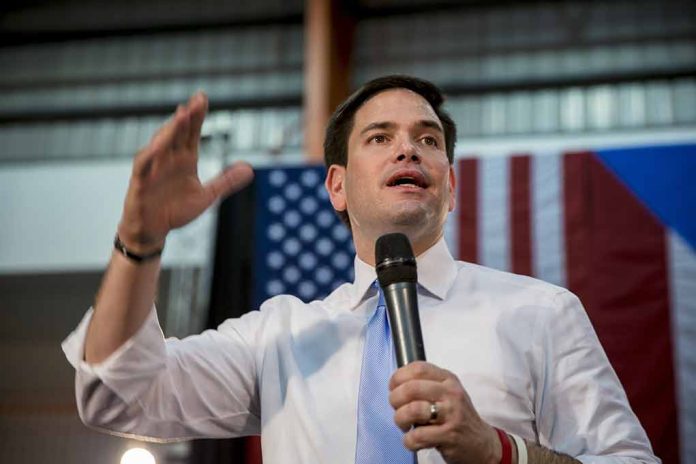
America withdraws from Ukraine-Russia peace talks as deadly missile strikes hit Kyiv, signaling a major shift in U.S. foreign policy that leaves the warring nations to determine their own fate.
Key Takeaways
- Secretary of State Marco Rubio announced the U.S. will cease its mediator role unless Russia and Ukraine present “concrete proposals” to end the conflict.
- The Trump administration is prioritizing domestic issues over international conflicts, expecting Europe to take a larger security role.
- Vice President J.D. Vance described the war as a stalemate, stating the U.S. will not waste political capital on unproductive negotiations.
- Russia proposed a temporary three-day ceasefire, but both the U.S. and Ukraine are pushing for a permanent, durable peace agreement.
- The U.S. withdrawal creates a diplomatic vacuum with no clear international mediator to replace American leadership.
U.S. Ultimatum: Concrete Proposals or American Withdrawal
The United States has formally announced its intention to step back from its role as primary mediator in the ongoing Ukraine-Russia conflict. Secretary of State Marco Rubio delivered this message in unambiguous terms, stating that both Russia and Ukraine must present substantial peace proposals or face American disengagement. The ultimatum comes after months of stalled negotiations and escalating violence, including a devastating Russian missile strike on Kyiv that further complicated diplomatic efforts.
“We are now at a time where concrete proposals need to be delivered by the two parties on how to end this conflict,” stated Secretary of State Marco Rubio, signaling the administration’s growing impatience. The Secretary emphasized that without meaningful progress, America would cease its diplomatic shuttling between Moscow and Kyiv, effectively leaving the warring nations to their own devices in determining how to proceed with the conflict.
The US will no longer mediate Ukraine-Russia peace talks. State Dept. says it’s up to both sides to find solutions. VP Vance warns the war won’t end soon, urging direct talks. This comes after Russia rejected a US proposal and Ukraine opposed recognizing Russian annexations. pic.twitter.com/1bq6KwVYFs
— Wayne DuPree (@TheDupreeReport) May 2, 2025
Trump Administration Shifts Foreign Policy Focus
The decision to potentially withdraw from negotiations reflects a fundamental shift in American foreign policy under President Trump, who has consistently criticized previous administrations for extensive involvement in overseas conflicts. Vice President J.D. Vance has characterized the Ukraine-Russia war as deadlocked, suggesting that neither side can achieve a decisive military victory. This assessment has led the administration to conclude that continued American investment of diplomatic resources may yield diminishing returns.
State Department spokeswoman Tammy Bruce reinforced this position, stating bluntly that the U.S. will not “fly around the world” to broker talks that show no signs of progress. The administration has made it clear that responsibility for the next steps now rests with President Trump, who maintains personal communications with both Russian President Vladimir Putin and Ukrainian President Volodymyr Zelenskyy.
Competing Visions for Ceasefire and Peace
The diplomatic impasse centers on fundamentally different approaches to ending hostilities. Russia recently declared a temporary three-day truce from May 8-10 to coincide with World War II victory celebrations. This limited pause in fighting falls significantly short of the comprehensive peace framework proposed by American negotiators. President Zelenskyy dismissed the Russian proposal as manipulation, calling instead for “an immediate, full, and unconditional ceasefire lasting at least 30 days.”
A central sticking point remains Ukraine’s resistance to formally recognizing Russia’s annexation of Crimea and other occupied territories. President Zelenskyy has remained steadfast in his position that any agreement must not reward territorial aggression, stating, “We all want this war to end in a fair way – with no rewards for Putin, especially no land.” This fundamental disagreement over territorial concessions continues to derail meaningful progress toward a resolution.
Implications of American Withdrawal
The American withdrawal from peace negotiations creates a significant diplomatic vacuum in Eastern Europe. With no clear international mediator positioned to replace the United States, concerns grow that the conflict may intensify further. The Trump administration’s expectation that European powers should take greater responsibility for regional security signals a redefinition of America’s global leadership role and a shift toward more focused national priorities.
As fighting continues in eastern Ukraine, with Russian forces advancing in the Dnipropetrovsk region prompting civilian evacuations, the humanitarian toll of the conflict shows no signs of abating. Without a credible peace process, military calculations may once again take precedence over diplomatic solutions, leaving millions of Ukrainian civilians caught in an increasingly dangerous crossfire with diminishing international intervention.
Sources:
US threatens to end mediation if Russia, Ukraine fail to offer ‘concrete proposals’
US to step back as mediators in Russia, Ukraine war if there is no progress: State Department
U.S. withdraws as mediator in Ukraine-Russia war







